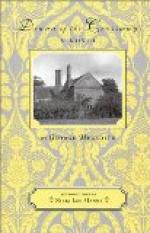Furthermore, Lady Dunstane’s allusion to her ‘enemies’ made him set down her growing crops of backbiters to the trick she had of ridiculing things English. If the English do it themselves, it is in a professionally robust, a jocose, kindly way, always with a glance at the other things, great things, they excel in; and it is done to have the credit of doing it. They are keen to catch an inimical tone; they will find occasion to chastise the presumptuous individual, unless it be the leader of a party, therefore a power; for they respect a power. Redworth knew their quaintnesses; without overlooking them he winced at the acid of an irony that seemed to spring from aversion, and regretted it, for her sake. He had to recollect that she was in a sharp-strung mood, bitterly surexcited; moreover he reminded himself of her many and memorable phrases of enthusiasm for England—Shakespeareland, as she would sometimes perversely term it, to sink the country in the poet. English fortitude, English integrity, the English disposition to do justice to dependents, adolescent English ingenuousness, she was always ready to laud. Only her enthusiasm required rousing by circumstances; it was less at the brim than her satire. Hence she made enemies among a placable people.
He felt that he could have helped her under happier conditions. The beautiful vision she had been on the night of the Irish Ball swept before him, and he looked at her, smiling.
‘Why do you smile?’ she said.
‘I was thinking of Mr. Sullivan Smith.’
‘Ah! my dear compatriot! And think, too, of Lord Larrian.’
She caught her breath. Instead of recreation, the names brought on a fit of sadness. It deepened; shy neither smiled nor rattled any more. She gazed across the hedgeways at the white meadows and bare-twigged copses showing their last leaves in the frost.




